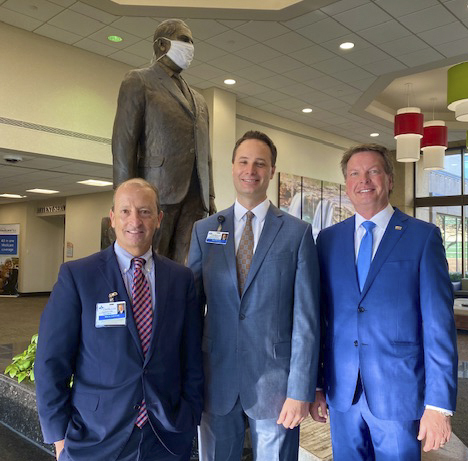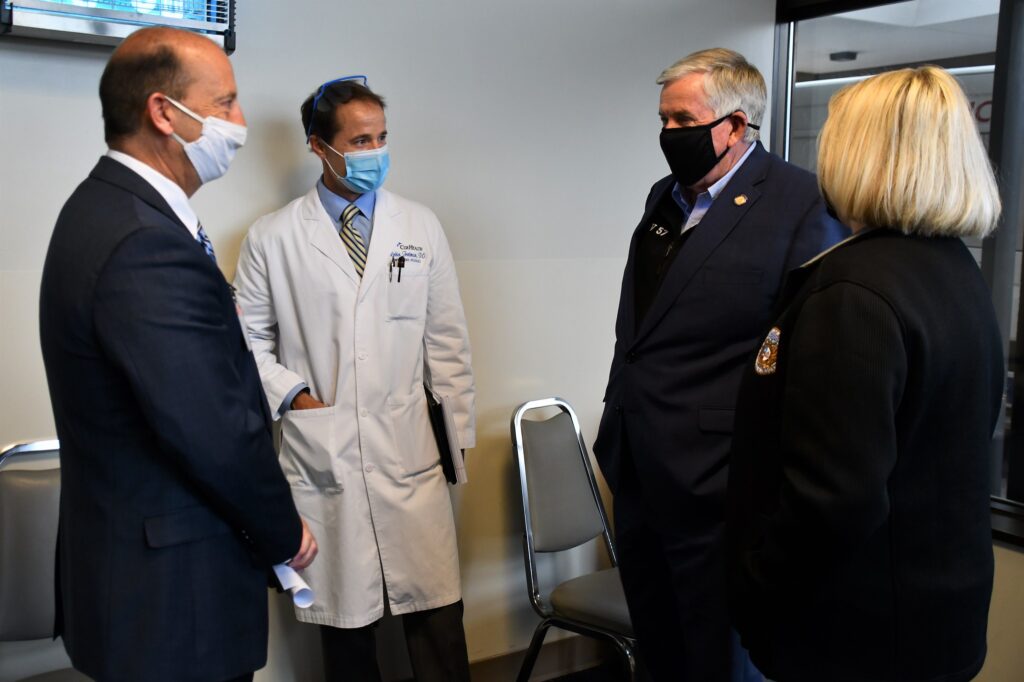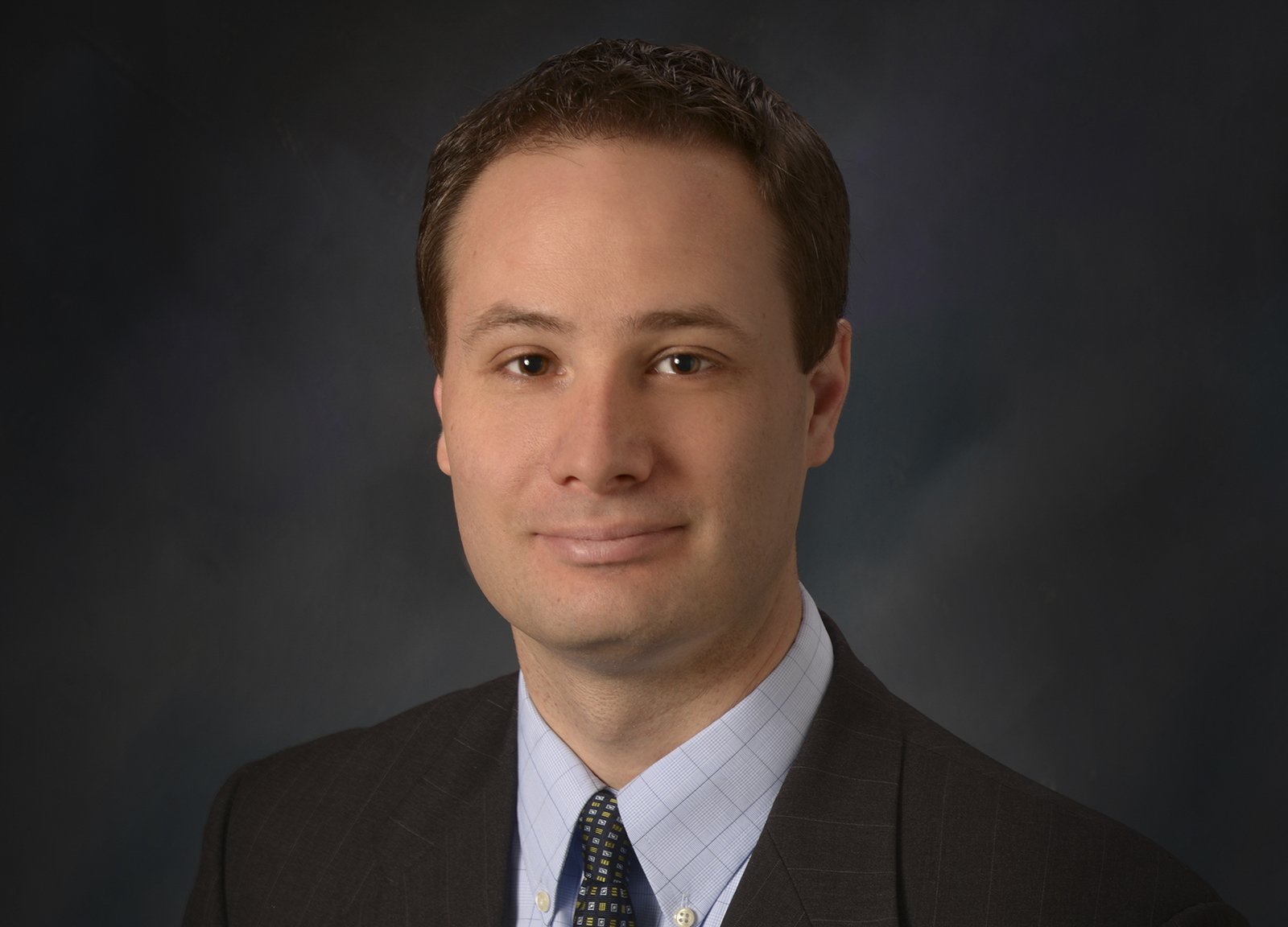For his final act as president and CEO of Springfield’s largest employer, CoxHealth’s Steve Edwards repaired a chipped piece of laminate in a locker room in the Meyer Center for Wellness and Rehabilitation.
It had been bothering one of Edwards' mentors and predecessors, former CEO Larry Wallis.
“About a month ago, he said, ‘You know, it's been bugging me, this piece of laminate has been chipped through two CEOs, and it's never been fixed,” Edwards said on May 26, a day before his final day as CEO. “So I made him suffer. But I've got it all prepared to fix it. It will be my last act.”
Earlier on that last day, he rejoined the grounds crew — his first of many positions during his 30-year career at CoxHealth — and planted some perennials and picked up litter. Circling back to his first days at the health care institution he led for the past decade may have sounded like a golden PR opportunity, but the media wasn’t invited. CoxHealth’s own media relations team was left trying to pin down when he’d be landscaping a day before he got his hands dirty. As he wrote in November when he announced his retirement, it was the way he wanted to finish his career.
Edwards has amassed a large following over the course of the pandemic on Twitter, where he assumed a more public-facing role as a local health leader during unstable times. He's become a regional (and sometimes national) voice on COVID news coverage, and a vocal advocate for public health.
On Twitter in recent weeks, along with posting about public health issues ranging from the pandemic to gun violence — a use of his platform as a community leader that he plans to continue — Edwards offered reflections of his time at CoxHealth as it came to an end. He shared a photograph of all of his employee ID badges. He remarked wistfully about his final board meeting. While Edwards said he will still serve as an advisor and confidante to new CoxHealth CEO Max Buetow when needed, he knows it will not be the same as walking through the halls day in and day out.
Edwards pointed out that his father and former CEO Charlie started working at Cox before he was born and was with the health care system through his college years.
“I think it's true that virtually every meal I've ever had has been provided, made available, because of this organization,” he said.
“I'm grateful, and I hope that people can appreciate how grateful I am for this organization that's virtually put every meal on my plate. I can't put that in words. It's probably trite, but that's my parting word is gratitude to this organization and everyone that's ever been involved with it.”
What’s next for Edwards?

The immediate road ahead for Edwards, he said, looks something like how he imagined summer when he was in sixth grade. He'll go fishing. He’ll canoe. He’ll play basketball. And he’ll spend lots of time with his wife, Jennifer, and their three children in an effort to make up for time lost while leading a health care system with six hospitals and 84 clinics through the start of a global pandemic.
He’ll continue to serve on several community boards, and said he’s got his eye on a national board or two. But not immediately.
“I've committed in the next six months to say yes to nothing,” Edwards, 56, said. “I'm trying not to fall into the trap of over-committing to things.”
Loren Broaddus, a friend of Edwards’ since their days at Glendale High School, said he and other friends would encourage the former CEO to extend that commitment to not committing for a year after Edwards delayed his retirement to help steer the CoxHealth team, and the community, through the outset of the pandemic.
“He's been under a great deal of pressure,” Broaddus said. “ And I think he's just been really courageous through all of this.”
Edwards became a vocal proponent of protective health measures that clashed with the actions of many in a county where over 47 percent of the population remains unvaccinated. He offered recommendations to city leaders about how to prioritize public health when little was known about the COVID-19 virus, and he sometimes expressed frustration when members of the community did not pitch in after vaccinations became available.
“This is difficult and so many are confused and misinformed and it is costing them their lives,” he wrote during the Omicron wave in January. “We are so sorry. 24 unvaccinated patients have died at Cox in the last 7 days and 73 in January. All would have likely survived with a vaccine.”
Broaddus said he could tell that Edwards was wired to be a leader from their days in high school and college together. His mind was quick, he said, and he would offer comebacks that Broaddus, an author, poet and teacher, said would have taken him three days to come up with. Determination and compassion were also obvious traits in Edwards, he said, and they were on display in his leadership through the pandemic.
“He's been under a great deal of pressure,” Broaddus said. “And I think he's just been real courageous through all of this. We knew he was built for this.”
On Monday morning, Edwards tweeted about the first “meeting” of his retirement – with a (largemouth) bass. Broaddus said he hopes his friend gets to do a lot of fishing now.
“But he’s not one to sit still for long, probably,” Broaddus said. “He’s got a drive in him. He’ll connect to something.”
Lessons from his father served Edwards as CEO, passed down to Buetow

Since his 20s, Edwards had planned on retiring at 55. In November, Edwards wrote that he’d received a cancer diagnosis and had successfully gone through treatment for it, while also gaining perspective from the experience and reaffirming his retirement goals. His father, who’d suffered several heart attacks while on the job, died shortly after retiring as CEO. When Edwards became CEO in his mid-40s, he found that he was financially on track to do it. But he missed his goal by a year, because he said he couldn’t fathom leaving CoxHealth in the midst of the early response to the COVID-19 pandemic.
Last week, Edwards spoke to the Daily Citizen about what he learned during the pandemic and throughout his time at CoxHealth and from his father.
Edwards’ father served as CEO from 1985 to 1993, and he said that now that he is at the end of his own time as CoxHealth CEO, he has taken some time to compare his tenure to his dad’s. When Charlie Edwards retired, the system employed about 3,200 people. When Edwards retired, it employed nearly four times that number. But Edwards argued that with the smaller team, his father likely had the harder job.
“I was one of the fortunate few that my dad is my absolute hero, without fault,” Edwards said. “And I never wanted to be outside of his shadow. I just admired him so much. But I have to tell you, it was kind of symbolic to me to have worked here longer and to serve as CEO longer than him. I guess that's the competitive side to that.”
He said his dad had an IQ somewhere in the 170s and was an excellent chess player. The ability to think many moves ahead served Charlie Edwards as a leader, and meant that his son could never beat him at chess. One day, Edwards remembers getting close. It was when he was in high school, while his father was recovering from a heart attack.
“And I had the upper hand on him,” Edwards said. “And I'm like, ‘I am not going to let him beat me.' So I just was being cautious and eliminating all his major pieces, one at a time, to secure a certain victory. And so the victory’s in my grasp, and he reached out and shook my hand and said, ‘It's a draw.' I'm like, ‘What do you mean?' He goes: ‘Well, I only have my king left. There's no place my king can move without being placed in checkmate. And so that's a draw.' I didn't even know that. That's the last time I ever played him, because I think I never wanted to ... you don't want to beat your idol.”
He said his father’s tendency to think several moves ahead translated to all aspects of life. He recalled that when he finished graduate school, his dad didn’t buy him a watch or a car to commemorate the occasion, but instead got him a subscription to Money magazine.
“He’d renew it every year,” Edwards said.

The reason Charlie Edwards gave his son a magazine centered on financial planning was to help him be secure enough in his personal life to be fearless in his professional one, Edwards said.
“And what I mean by that is money in the bank gives you courage,” Edwards said. “Many people, I think, are so fearful that they'll be fired that they are cautious, and they don't do their job. They just try to keep from losing their job. And when you've got enough money saved up, it does buy you a lot of courage.”
Edwards said that’s a lesson he’s passed on to Buetow, who was promoted to CEO earlier this year.
“Of course, Max is already wired that way,” he said.
Rob Fulp, chairman of the CoxHealth board of directors, said Edwards “truly cares for all walks of life,” and that trait was central to his vision as a leader.
“The other night, we had our last board meeting, and I remember I went around the room and I asked each member of the board of directors to make a few comments on how Steve has affected their lives,” CoxHealth Board of Directors Chair Robert Fulp said. “And it was a very emotional board meeting. I remember at the very end of it, my last words in the boardroom that night were that we've just been very fortunate to have Steve Edwards, and he's just a class act. And that was the last thing we said. And I really mean it, he is a class act.”
Response to pandemic forged an incomparable bond

When Buetow’s promotion was announced, he told the Daily Citizen that, while there is pressure that comes with being the CEO, he viewed the team of leaders that Edwards helped put in place as a “gift.”
Edwards said that group, himself included, was shaped by the need to rapidly respond to the COVID-19 pandemic.
“There's obviously a lot of tragedy and a harsh reality of what we went through, but it's also a time that bonded us in ways that nothing would have compared to,” he said.
From the boardroom to top levels of CoxHealth leadership to the system’s frontline workers, Edwards likened the experience of navigating the first waves of the coronavirus to experiencing combat.
“I do think that health care went through what maybe soldiers in battles go through, kind of a band of brothers mentality where you grow immensely tight,” Edwards said. “You don't even want to talk about what you've gone through. But you've got these brothers, and you couldn't leave your brothers. You couldn't leave the battle.”
Edwards said he believes the pandemic seasoned young executives in ways that a decade of normal health care operations could not have.
“So people like Max Buetow and Amanda Hedgpeth and some of our young leaders, they've been through battles and they're hardened and smart and savvy and better for it,” he said.

In his final days as CEO, Edwards continued to provide updates on Twitter about the latest numbers of COVID patients across the CoxHealth system while also routinely advocating for community members to get vaccinated as part of their civic duty. While the system is experiencing an uptick, he is hopeful that months like July 2021, when 75 people died due to COVID complications, are behind us. He is also hopeful that the rapid responses required across health care systems during the pandemic can be replicated to address other public health crises in Springfield and the surrounding area.
Edwards said that, when leadership made a policy decision to implement masking at CoxHealth hospitals and clinics, it required balancing the need to prevent disease prevalence and risk with determining the right time to begin it, knowing that there would come a point when many residents would grow weary of the mandate. The decision, he said, was made at 5:30 p.m. on a Friday. The next Monday morning, everyone across the regional health care system was following the policy.
“That might have been a year-long process before the pandemic,” he said.
“I've given this talk to some of our leaders that there is probably no organization as effective and efficient as the U.S. military at war. And there's probably no organization as bureaucratic, inefficient and wasteful as the U.S. military at peace. So we're moving from wartime to peacetime, and how do we optimize those things we learned during this crisis – that we don't lose when the situation is more stabilized. A lot of this is accelerated advancement of policies, leadership. How we led the organization changed dramatically. The culture of innovation, I think, became maximized because we had no option. Oftentimes, if we don't take the patients, there's literally nowhere for them to go. Hospitals all across the region were full, and so we had no choice but to expand. I hope that the organization takes that lesson, and finds a way to maintain the agility and the efficiency and, most importantly, the rapid decision-making that we had in the pandemic and not replace it for a plodding bureaucratic period where we're back to ‘normal.'”
Edwards said that his father’s advice to lead like there’s money in the bank served him most during the pandemic.
“Speaking up to City Council about putting protective measures in,” he said. “Making decisions like increasing our capacity. Some hospitals were strategic during the pandemic to not increase their capacity because COVID patients, from a financial analysis, hurt the bottom line. There are some hospitals that just capped their number of COVID patients, and then they had to go somewhere else. I think that was a good business decision for them, and many of them have fared well. But that's just not how we were wired, and so those kinds of decisions were tough to make.”
One such decision, he said, involved the purchase of a million-dollar piece of diagnostic equipment that would only be used in the COVID intensive care unit located in a hastily converted storage space in the Cox South Hospital’s West Tower. The equipment already existed at the hospital, but getting a COVID patient to it involved transporting an infectious, and often deathly ill, person through the hospital.
“Worst business decision you can make, and maybe the best decision we can make from our physician's perspective,” Edwards said. “We told them we supported them, and our board didn't hesitate to support those decisions. So, lots of decisions that I think if I was responsible up to a for-profit corporation, it would have never allowed it. I get credit for what the board's done to support us and I've often maybe benefited by being the voice for so many people. But it doesn't mean I did all this, right? I just was their voice.”
“I think I’ll keep being a voice”
As CEO, Edwards served as the voice of a massive health care system, but during the pandemic he developed a platform for his own voice. His following increased as he shared what doctors, nurses and others at CoxHealth experienced on the frontlines and implored a community with a below-average vaccination rate to do its part in the name of public health.
“I admire the way Steve put himself out there and created an unprecedented amount of transparency with what was happening in health care, and that is something we as an organization will absolutely work to continue going forward,” Buetow said last month.
Edwards has had his Twitter account since December of 2010, and many of his pre-pandemic tweets align with subject matter that still drives him to push send. He has long been a cheerleader for fellow CoxHealth employees, and he has long advocated for causes that he says fall under the umbrella of improved public health, no matter whose politics they might rankle. He has shared numerous arguments against marijuana legalization, pointed out massive profit margins for prescription drug makers and posted a pro-LGBTQ quote by Pope Francis.
He said he was brought up in a family that encouraged him to use his voice, and he has long believed that people who have a platform should honor that, and use it for good. He said that his platform developed accidentally during the pandemic.
“It's a small platform,” he said of his 13,800-follower account. “But I'm compelled to use it. (Thursday), I tweeted that last week, the New England Journal of Medicine put out a study that, for the first time, I think, in the history of humanity, more children died from guns than any other illness. I get that a lot of people want to make that political. I look at it as a public health issue. More children are dying from guns than car wrecks and dying from guns than congenital anomalies?
“I think I'll keep being a voice,” he said.

